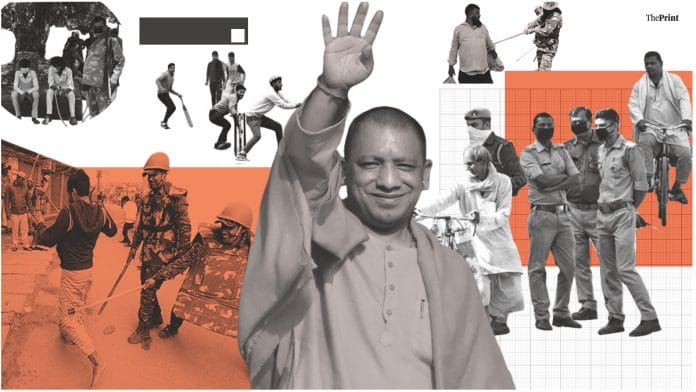The Yogi Adityanath-led UP government has cleared the Public Health and Epidemic Disease Control Ordinance, 2020 that prescribes life imprisonment for “death caused by intentional (Covid-19) affliction”. If a Covid-19 patient hides their condition, they face up to three years of imprisonment and a fine of Rs 50,000-1 lakh. Attacking frontline workers or ‘corona warriors’ is also punishable.
ThePrint asks: Yogi govt law on intentional infectors: Is criminalising the right way to fight Covid?
Fear of punishment will make people avoid Covid testing; criminalisation will increase infections
 K Sujatha Rao
K Sujatha Rao
Former union health secretary
The ordinance passed by the UP government is unenforceable because it is difficult to identify criminal intent by an infected person. Besides, it also ignores asymptomatic individuals who may have passed on the infection unknowingly.
There is a huge scope for arbitrary and capricious state action. Such laws are highly amenable to being misused by a biased investigating agency on grounds other than Covid like their caste, creed, religion, gender, etc.
In the 1980s, Cuba tried to implement a similar primitive law to curb the infection of HIV with strict sanatorium measures and provisions of life imprisonment in case of repeated violation of preventive guidelines. The country eventually changed its policy after receiving international criticism, including from the WHO. I wouldn’t be surprised if WHO comes down heavily on India for the UP law too, which would negatively impact the country’s international prestige.
The ordinance is also counter-productive and violates the environment of trust and empathy critical for dealing with a public health crisis. Criminalisation of disease and persons vulnerable to such infections tend to push the issues underground. People do not come forward to either get tested or report symptoms, infecting more people in the process. We saw this in the early years of HIV epidemic.
Covid-19 is a humanitarian disaster, making it a law and order problem will only heap misery on poor
 Amir Ullah Khan
Amir Ullah Khan
Professor of Health Economics at Indian School of Public Policy
The Indian legal system is based on a very clear and moral distinction between civil and criminal wrongs. A civil wrong is one where a person, possibly unintentionally, does something that results in death, injury, illness, or damage to someone else. A criminal wrong is one where someone violates a law or a statute. The crime is against society. Our ruling party, particularly in Uttar Pradesh led by Yogi Adityanath, has in several cases decided that all wrong deeds are criminal, and therefore must be dealt with an iron hand. Eating beef, carrying old Rs 1,000 notes, divorcing your partner, propagating your faith, drawing cartoons — these are possible civil wrongs that are now seen as criminal acts by the government and the UP police.
So, it is not surprising that the new law being proposed criminalises infection. Section 269 of the Indian Penal Code already prescribes six-month imprisonment and/or fine for those who spread dangerous infection because of negligence. Section 270 grants a two-year term for those malignantly spreading infection.
This new provision is draconian and unnecessary. It gives the state the authority to exercise discretionary powers that will only vitiate the atmosphere. We have a humanitarian disaster on our hands, making it a law and order problem is only going to heap misery on the poor and underprivileged.
UP govt’s intent to protect frontline officials is right but move will further stigmatise Covid-19 patients
 Rahul Verma
Rahul Verma
Fellow, Centre for Policy Research
The road to hell is often paved with good intentions (and shortsightedness). Prima facie, the intent behind the Uttar Pradesh government ordinance seems good considering it aims to protect frontline officers and doctors who may have faced harassment by coronavirus-infected patients. The law also aims to deter Covid-19 positive people from hiding information from others because it can potentially put a lot of citizens at risk. Thus, UP chief minister Adityanath and his cabinet may have felt that by promulgating this ordinance, they are putting a tight safety net.
However, operationalising such a law may lead to further problems rather than offering solutions to deal with the current crisis. The biggest challenge would be to establish criminal intent in this case, especially when the police force (which will be tasked to establish criminal intent) is overburdened. This could be a disastrous policy move as it will further stigmatise already suffering Covid-19 patients and her families.
In my opinion, there may be a handful number of people hiding their infection status (or behaving rudely with the doctors and nurses) and thereby spreading the disease. We don’t need another law that has been hastily put together by the state cabinet and senior bureaucrats, without thinking deeply about the unintended consequences. The cabinet should have held a wider consultation with doctors who are at the forefront of the Covid-19 crisis, epidemiologists who have a far better understanding of such diseases spread, and legal experts.
Yogi govt took tough stand on Covid crisis right from the beginning. This ordinance is part of it
 A.K. Verma
A.K. Verma
Director, Centre for the Study of Society and Politics, Kanpur
The coronavirus pandemic has claimed many lives around the world. In US, the deadly virus has caused 70,000 deaths. Does this mean that the West took Covid-19 lightly?
India is fortunate that early initiatives by PM Narendra Modi — lockdown and social distancing — have kept Covid-19 casualties low.
Unfortunately, a few people from the Tablighi Jamaat created an unfortunate situation by hiding their infection and being carriers — thereby, threatening the lives of their relatives as well as society.
To add insult to injury, when they were brought to hospitals, they reportedly spat at doctors and misbehaved with them. Some made offensive remarks against nurses in a Ghaziabad hospital, and were also roaming around nude.
They became a headache for the doctors, nurses and the local administration.
If left unchecked, they would become an even bigger threat. This could demoralise the Covid warriors.
UP CM Yogi Adityanath took a tough stand right from the beginning when there were initial attacks on doctors at Moradabad and elsewhere. So, as the national as well as state governments confront the Covid-19 crisis, all steps — be it medical, legal, psychological and social — should be taken to defeat it and save humanity. The latest Yogi ordinance should be seen in that context.
Also read: How can Mamata Banerjee’s TMC recover lost political ground after ‘fudging’ Covid numbers?
By Pia Krishnankutty, journalist at ThePrint







Such laws are not going to help the fight against the coronavirus.
The ordinance is bad in law. How one can decide who is an intentional infector? One can say person is a negligent infector, but an ‘ intentional’ infector? How a motive can be proved in such circumstances? The ordinance should be challenged in the Apex Court.
?
Once a person is advised home quarantine, or has been diagnosed as infected, or has been hospitalized due to infection, he/ she cannot be considered Ill informed. If such a person deliberately acts in a manner facilitating the spread of the infection, then that person is criminally liable. There are precious human lives involved, and cannot be risked by such criminal acts. As this infection is vastly different in its nature,the world has not witnessed, it will take a new approach to contain it.